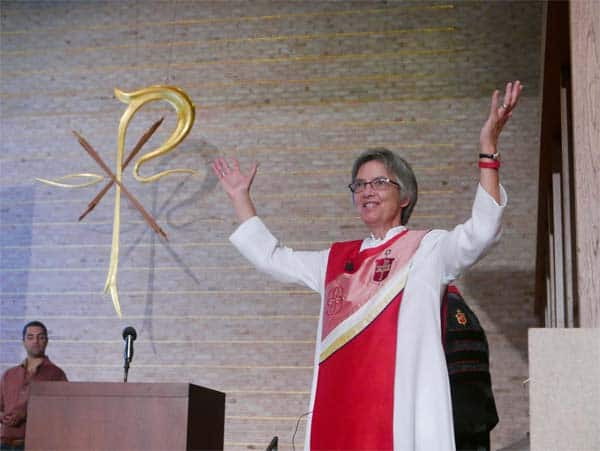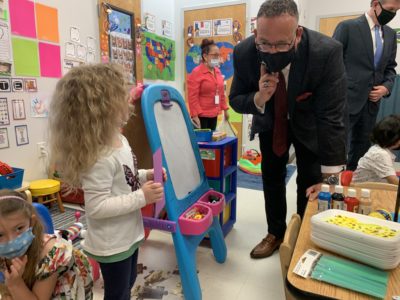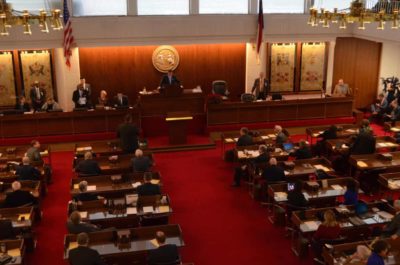
Though there is a separation between faith communities and public schools, faith leaders are interested in educational issues. Hope Morgan Ward, the bishop of the North Carolina Conference of the United Methodist Church, feels it is important for people of faith to do what they can to make public schools better. But it does not mean getting religion into the classroom. For Ward, it is about getting members of her church to do more to support the work that public schools are already doing. One way is through Congregations for Children (C4C), a statewide initiative of the United Methodist Church to help improve K-3 literacy, make sure that students have their basic needs met, and increase the involvement of parents in schools. Bishop Ward spoke to EducationNC about the initiative. The interview has been edited for clarity.
Alex Granados: Tell us about Congregations for Children.
Bishop Hope Morgan Ward: It was birthed out of interest from a number of our congregations. Interest in part with the local public schools. And we went to a grand scale with it. Now across the state of North Carolina, where we have 2,000 churches from the coast to the mountains, we partner with public schools in communities. And we do that by simply walking across the street and talking with principals and asking them how we can be helpful. How we can assist them?
We have been funded by the Duke Endowment to bring structure around this good work and to train our volunteers well, and our four focus areas for the work are first of all to help children have the basic necessities that they need to succeed in school: school supplies, backpacks of food if that’s needed over weekends and holidays. The second focus is literacy: helping children learn to read by the third grade. And we do that by a collection of books and tutoring and summer reading camps. And the third is engaging significant adults in the lives of children, especially men. And we do that by training men to be present in schools, especially elementary schools. Many children lack a male role model in the home. And the fourth area of focus is helping our congregations understand the impact of poverty on children.
Granados: How long have you all been doing this?
Ward: We’ve actually been engaged in this for about 20 years. The first connection that we made was about 1999 or 2000 when I was visited by someone at a local church who came and told me about the wonderful partnership that they had created with their local school. And she asked me if there was anyone that I knew at the Department of Public Instruction, that we needed to take this to more churches and more schools, and at the time my husband Mike Ward was the Superintendent of Public Instruction. She hadn’t put Ward and Ward together. So I laughed and said, “Yes, I think I do know someone.” And from there we had conversations. The Duke Endowment became interested in helping us develop the partnership, and at that time it was called “hand in hand.” Four or five years ago, we sort of re-upped the initiative and gave it the name Congregations for Children or C4C for short.
Granados: What is your hope for this program and its impact for education in the state?
Ward: Our hope is that children will be surrounded by supportive adults. That they will have what they need: food, school supplies, some of our churches collect coats. I mean whatever our teachers and administrators tell us that the children need, we try to provide. The connection with children, particularly in mentoring and tutoring around language and reading is really central for us because reading is so basic in the life and education of a child. Our volunteers love this work. There is great joy in our churches. The connection and the friendships that develop bless those who go and help in the school, we think maybe as much as the kids who receive the help.
Granados: You all are going to start branching out into the policy arena and doing more advocacy work, right?
Ward: We are. You ask about our goals and our hopes. We wanted to help create more caring communities for our children, and we knew where to do that was in partnership with public schools that welcome all children. Last year, together, across the state at our annual meetings in the western and eastern regions of the state, we adopted together a resolution creating what we’re calling MAPS: Methodists Advocating for Public Schools. We want to engage with the General Assembly as advocates for higher funding levels for public schools. We have been studying the data and we know the realities in our state. We also know that teachers are fleeing for places where they have better compensation, where they have better benefits. Where they’re supported more strongly with continuing education and professional development.
Granados: What is that going to look like?
Ward: We are at the creation stage of this. In fact, just recently, we had a summit, a gathering of people to come receive information from a professional educator in our state: Dr. Mike Priddy. He helped us understand the reality. Dr. Priddy has been a superintendent and is now the chairman of the Public School Forum Board of Directors. So we’re learning more about the issues that are most impactful on public schools and our children and also considering ways to be strategic and effective advocates. We had over 75 people at that meeting by the way, on a Wednesday afternoon.
It definitely will involve being in touch with legislators. Mobilizing people to be in touch with senators and representatives here in North Carolina, with the governor, with others who can make a difference in the General Assembly.
Granados: You mentioned funding levels. You mentioned better compensation for teachers. Are there other areas that you think aren’t receiving the attention they deserve?
Ward: One observation that came out of the meeting is that a critical issue for public schools is the redistricting dynamic that is unfolding. It’s essential that we create districts where there is equitable access of voters to polling places and where the will of the electorate is accurately delivered in the election of people to serve us. We also are concerned about vouchers because vouchers take away support for public schools and we believe it’s unconstitutional, the state law.
Granados: Why start now with advocacy work?
Ward: We have done advocacy work in the past. I have made calls as the Bishop. Bishop Leeland in Charlotte and I together have given voice to this. We have also joined with other leaders from the Episcopal Church, from the Lutheran Church, from the Presbyterian Church from the Roman Catholic Church in the past. This particular movement came forward because of the resolutions passed by our people in 2016 saying we want to advance this, be more proactive, be more effective in giving voice to these hopes. That North Carolina will rise again as a state known for a strong educator commitment and outcomes.
Granados: When we talk about religion and schools there is often a lot of talk of separation of church and state. But we also often see churches getting involved in education. Why is it important for people of faith to get involved?
Ward: The social principals of our church state that it’s the responsibility of the political and social and religious community to work together to meet the needs of children, families, schools. Again, I would like to emphasize that when we establish a partnership with a school, the question is, “Can we help you in any way? How can we help you?” And then, each of these partnerships is created out of the answer to that question.
We have yet to have a principal say, “There is no way you can help us.” When we ask principals, “How can we help you?” their answers lead to those four priorities that I mentioned earlier. Often we begin with providing basic needs for kids. One of our churches shared with me that those pencils, backpacks, and glue sticks that they collected back in September were probably used up by December, and so in January they did it again for the spring semester. We know that with the pressure on budgets, teachers don’t have the supplies that they need, the things in their classrooms that they would like to have to teach. And so we want to help do that.
Also the emphasis on literacy. That came because local administrators said reading is so essential. We know that we can project success, not just through school but through life by their ability to read by third grade. And we know also that prisons are built on the levels of literacy of small children. So it’s very very important to collect books. Many kids don’t have books at home, so we partnered with what was formerly called Give Five — Read Five. I think it has been renamed (It is now called NC Reads). We had a church in Garner that collected 27,000 books. They started out collecting books for one grade level and they ended up giving five books to every child in the community in a number of schools: kindergarten, first, second, and third grade at the end of the school year. We had a church in New Bern that did the same thing. They had a huge book fair and the kids came in and they said, “Go get five books.” And children couldn’t believe that they could just go take them home and have a gift of a stack of books for the summer. We also hear consistently of the need for adult role models, particularly men, and so we created that channel. And of course the impact of poverty for kids.
Granados: Are people as aware of the impact of poverty as they should be?
Ward: We have discovered that the lack of relationship in our communities is a reality that we have not faced. People in poverty tend to live in certain areas of our community — there are sort of two realities of these communities: those who have and those who don’t have. I’ll just share confessionally in one of the training events, we had 40 volunteers who came to be trained to be involved in Congregations for Children. The trainer asked them, “Are you aware in this county of the high number of kids who are free and reduced lunch?” It’s 100 percent. And they said, “Yes, we are very aware.” And she asked a very probing question. “How many of you know a kid on free and reduced lunch?” And there was silence. So we had a wonderful dialogue of people wanting to make a difference, knowing the data, knowing the reality of numbers, but not having the personal relationships with kids who are impacted by poverty. And so someone in the room stood up immediately and said, “I promise you I will know the name of every first grader,” and she named the school near the church. So building those relationships are key for people who have more to be blessed by people who have less and vice versa, because the blessing flows both ways. We don’t know one another. And so bad things happen.
Recommended reading



